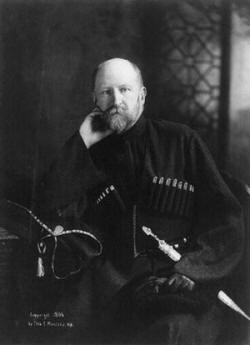

Partner Percy Gothein, Ernst Kantorowicz
Queer Places:
University of Oxford, Oxford, Oxfordshire OX1 3PA
Haus Schlosspark, Schloß-Wolfsbrunnenweg 18, 69117 Heidelberg, Germany
 Moritz
August Woldemar Graf Uxkull-Gyllenband
(born April 17, 1898
in Bogliasco
, † May 24, 1939
in Reutlingen
) was a German ancient historian
. The dedica of
Woldemar Graf Uxkull-Gyllenband's book on Greek sculpture is to
Percy Gothein and takes a line from a verse that Uxkull's deceased brother,
Bernhard Graf
Uxkull-Gyllenband, had written to his own same-sex lover: "We rarely had a
rich day when love did not course though our blood."
He had a relationship with
Ernst Kantorowicz.
Possible it was Uxkull who made the first move, for he previously had a
same-sex affair with Percy Gothein (Gothein was arrested several times during
the Nazi era for engaging in homosexual acts and died in Neuengamme concentration camp).
Moritz
August Woldemar Graf Uxkull-Gyllenband
(born April 17, 1898
in Bogliasco
, † May 24, 1939
in Reutlingen
) was a German ancient historian
. The dedica of
Woldemar Graf Uxkull-Gyllenband's book on Greek sculpture is to
Percy Gothein and takes a line from a verse that Uxkull's deceased brother,
Bernhard Graf
Uxkull-Gyllenband, had written to his own same-sex lover: "We rarely had a
rich day when love did not course though our blood."
He had a relationship with
Ernst Kantorowicz.
Possible it was Uxkull who made the first move, for he previously had a
same-sex affair with Percy Gothein (Gothein was arrested several times during
the Nazi era for engaging in homosexual acts and died in Neuengamme concentration camp).
Woldemar Graf Uxkull-Gyllenband was the son of Count Woldemar von Uxkull senior and the writer Lucy Ahrenfeldt . The Uxkull family came from the Baltic nobility. Already at the age of nine, in autumn 1906, [1] Woldemar and his brother Bernhard von Uxkull-Gyllenband were "discovered" on the street by Ernst Morwitz , who was in close contact with the well-known poet Stefan George and was looking for Pupils for the George Circle . The brothers grew up in the Bavarian Quarter in Berlin where Morwitz taught them privately. Nevertheless, their academic achievements fell short of expectations, so that from 1912 they attended the high school of the Ilfeld monastery school in the Harz Mountains . As can be seen from letters to his brother, he was expelled in 1915 after a "serious violation" of the school's school regulations. [2] From 1916 Woldemar was prepared in private lessons for school; he was also in regular contact with Stefan George himself. [3] In 1917 he graduated from high school in Fichtegymnasium in Berlin.
Thereafter, from July 1917 to January 1919, Uxkull was a soldier in an elite unit of the Prussian army (Guard-Rifle Battalion Berlin-Lichterfelde), initially as a recruit, and then in February 1918 as a front-line mission in Macedonia. After the end of the war he began to study ancient sciences and ancient history, first at the University of Munich , then in Berlin and finally in Heidelberg . After having had contact with Stefan George several times before and during the war, Uxkull was in 1919 at a meeting in Heidelberg together with Percy Gothein and Erich Boehringer , whom he already knew from his studies, in the George circle. Through the district he came in 1919/1920 in contact with Ernst Kantorowicz , who became a close friend and lover - Kantorowicz described him as "table companion and bed play" [4] - and dedicated him his extremely successful book Emperor Frederick the Second . Both lived in the same house in Heidelberg for a while. [5]
As a student Alfred von Domaszewskis he received his doctorate in 1922 in Heidelberg on the sources of Kimon -Biografie Plutarch ( magna cum laude ). 1923/24 Uxkull-Gyllenband was in England, where he did research in the British Library in London and attended lectures in Oxford. In 1925 he habilitated for Ancient History with Wilhelm Weber in Halle with an examination of Plutarch and the Greek biography , an extension of his dissertation. After a number of professorships, he accepted the chair for ancient history at the University of Tübingen in 1932 . A call to Kiel he refused in 1934.
He was a cousin of Alexander, Berthold and Claus Schenk Graf von Stauffenberg , who had also belonged to the George Circle since the 1920s. Alexander, also an ancient historian, was particularly close to him. In Tübingen, Gyllenband was also close friends with Carlo Schmid . After the takeover of the Nazis on 30 January 1933 Uxkull-Gyllenband fell rapidly under the influence of Nazi ideology . In a speech about the revolutionary Ethos Georges to the Tübingen student body on the occasion of George's 65th birthday in July 1933, he interpreted National Socialism as a fulfillment of Stefan Georges' visions. [6] As a result, many of his old friends turned away from him. Especially Kantorowicz, who was already discriminated against as a Jew, to whom he sent a copy of his dedication, was horrified. Kantorowicz provided his copy of the writing, which he perceived as an insult to Secret Germany , with devastating marginal comments: "Totally irresponsible" - "pathetically banal" - "insulting in every degree of exaggeration and poverty". In the same year Uxkull held the lecture Von Sparta's downfall within the framework of Wolfgang Frommels midnight programs in the Reichssender Berlin , in which he clearly opposed the totalitarian Sparta and for the more democratic Athens positioned. This lecture can perhaps be read as an indirect statement against the National Socialist ideology. [8th]
Uxkull died in 1939 as a result of a traffic accident. He is buried in the Tübingen city cemetery.
My published books: